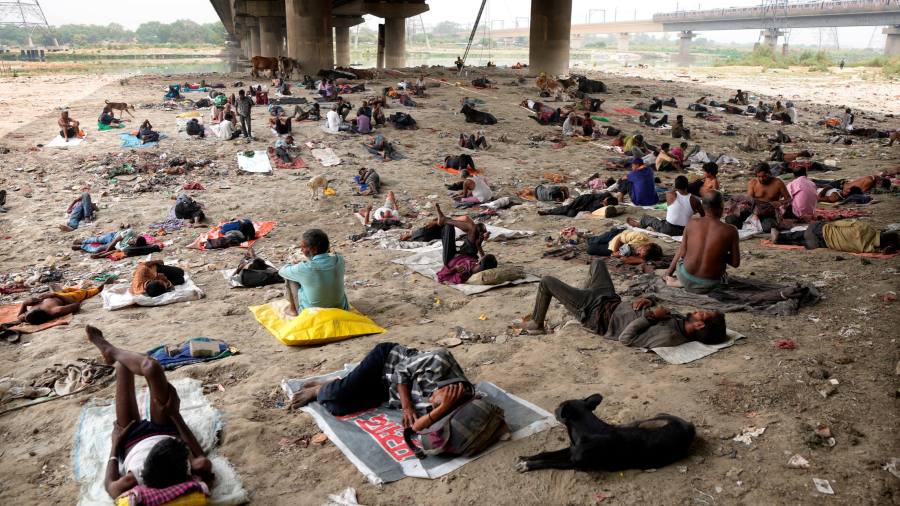
The writer is founder and chief executive of Climate Alpha and author of ‘Move: How Mass Migration Will Reshape the World — and What It Means for You’
The three salient facts of human life on Earth today are that we are about to number 8bn people, we face enormous demographic imbalances between the old and the young, and climate change is upon us.
This calls for nothing less than a new human geography. We must shift away from the sovereignty that dictates our distribution across the planet towards a more dynamic equilibrium that favours collective human survival and productivity.
Since the 1970s, the global fertility curve has flattened. Where once we feared runaway overpopulation, the news that we will cross the 8bn milestone next week now seems almost anticlimactic. Some parts of Africa and south Asia remain densely populated but, even there, fertility is plummeting. No country was spared the twin “baby busts” of the global financial crisis just over a decade ago and the Covid-19 pandemic, whose total economic impact on fertility is still to be seen.
On top of that, climate change sounds the death knell for fertility, with almost half of the world’s youth expressing concern about having children for fear of the apocalyptic hellscape they may grow up in. Once our children stop having children, “peak humanity” is just around the corner.
And there’s little reason to be confident that the usual proportion of those 8bn of us alive today will make it to the mid 2030s, when current forecasts suggest we may hit 9bn. Covid, conflict and climate change could hasten our demographic demise. The pandemic has already claimed just over 6.5mn lives. Conflicts and state failure from Myanmar to Syria to Ukraine to Venezuela have killed and displaced millions of people in just the past decade, stunting entire societies. And we have witnessed mass deaths from heatwaves that stretch from Canada to India — all before the world heats up to levels that are now considered inevitable.
It is a tragic irony that the majority of young people — the demographic future of our species — are trapped in sweltering geographies from the Horn of Africa and the Levant to south and south-east Asia. A failure to offer them a means of escape will accelerate ecocide on a scale that ultimately impoverishes us all.
In the west, infrastructure is decaying and we lack the labour to rebuild it, our elderly are perishing without enough medical staff, home values will sag amid depressed demand and stagflation will persist as frictions rise in accessing cheap labour and resources.
Since the industrial revolution, western civilisation has been dismal at safeguarding geopolitical stability, reducing economic inequality and protecting the ecological commons. Yet it has been spectacularly successful at assimilating hundreds of millions of migrants from around the world. This, as much as any technological advance, has bolstered its edge.
It is time to recall that collecting people is collecting power, for the decimal place of migration is inevitably shifting to the right. The 21st century will feature more than 1bn people on the move, whether climate refugees, political asylum seekers or young workers seeking a better life. It is better to attract and harness human capital as Canada is doing than to squander and scare it away like Russia.
Mobility should be the cardinal human right of the 21st century. Yet this aspiration increasingly rubs against the inertia of sovereignty in a world with more borders than ever before. No forum appears less suited to co-ordinating mass migration than the UN, with its 193 states jealously guarding the right to protect their boundaries.
At no COP summit does climate adaptation — to say nothing of migration — get the attention it immediately deserves. Attendees continue to pine for climate mitigation through decarbonisation, something better accomplished through technological innovation than emissions-spewing air travel to big-tent meetings.
More habitable regions need to think about how to reprogramme themselves into an archipelago of centres for our future civilisation. This enlightened scenario urges us towards a world of demographic mobility combined with sustainable infrastructure.
The other scenarios on offer portend a neo-medieval world of warring fortresses, fending off at the gates those who both need and could offer help. Whether the human population peaks at 10bn or collapses suddenly to only 5bn or 6bn may well depend on the path we choose now. Either way, for the inhabitants of the future, mobility will be destiny.